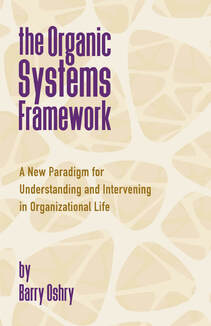|
Imprint: Triarchy Press
Published: 2nd September 2019 List Price: £15 Format: Paperback Extent: 60pp. Size: 14 x 21.6 cm (8½x5½") ISBN: 978-1-911193-61-6 Tags: Systems Thinking, Power and Love, Organization Development, organization paradigms, understanding organizations, OSF, organic systems framework Published in September 2019, The Organic Systems Framework is available to buy here now.
Buy the paperback (£15)Buy the pdf (£13)Click the 'Buy' button below. At checkout, click No postage on ebooks from the dropdown.
After paying, we will send an immediate confirmation and email your ebook file within 24 hours. version: bookmarked pdf
(pdf text cannot be edited, printed or copied - email us if you need this capability.) |
The Organic Systems Framework
|
ReadershipSetting out clearly and succinctly his theories of:
...Barry Oshry makes a compelling case for the Organic Systems Framework to be treated as the first organization/management paradigm. This, then, is a book for academics, researchers and students of management, organization and leadership theory and practice. Read more:By the same author:Related titles: |

